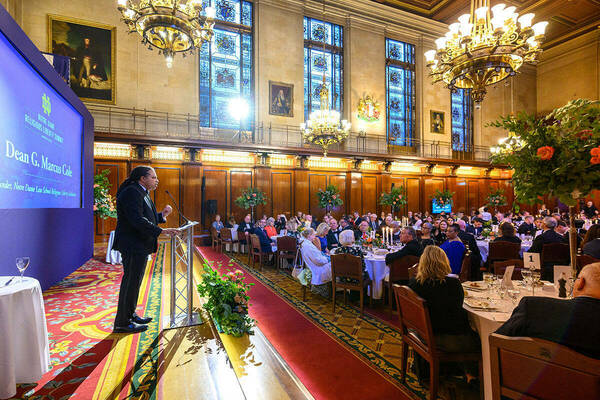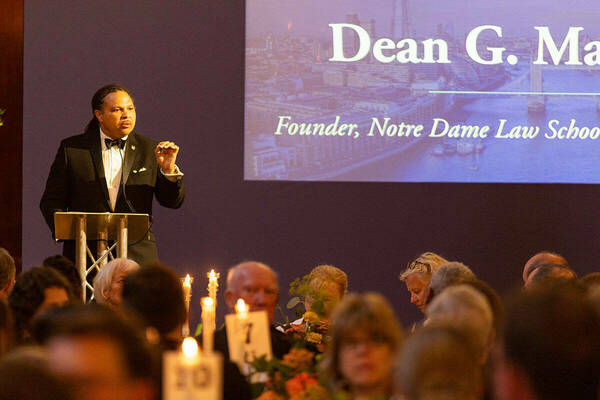2023 Notre Dame Religious Liberty Summit: Dean G. Marcus Cole’s remarks at Gala & Award Dinner

Good evening, and welcome to the third annual Notre Dame Religious Liberty Summit Gala Dinner, highlighted by the award of the 2023 Notre Dame Prize for Religious Liberty to Lord David Alton.
I am grateful to God for this gathering tonight. I give thanks for the University of Notre Dame and its President, Fr. John Jenkins, who have supported the Notre Dame Religious Liberty Initiative. I also want to thank all of those who have made this moment possible. I am deeply grateful to all of our donors, especially the Moroun Family, for helping to make us a real force for religious freedom. I am especially grateful for the leadership of Professor Stephanie Barclay, for believing in my vision, and taking a leap of faith that together, we could build a truly unique institution.
I also want to thank John Meiser. Without his skill and ability, we would not have had the many successes that we have enjoyed so far.
Tonight is really and truly a celebration, not just of Lord Alton and all of his accomplishments, but also of the work that the Religious Liberty Initiative and Clinic have done behind John Meiser and Stephanie Barclay.
I also want to express my gratitude to our lawyers — Meredith Holland Kessler, Brendan Wilson, and Francesca Mattozzo — and to the many members of our staff who helped make tonight’s celebration possible.
Finally, I am also deeply grateful to the John Templeton Foundation and Dr. Greg Wolcott for making this Summit and these conversations possible.
While I hope that you all have enjoyed the events that our team put together this week, they all were motivated by a desire to foster conversation between all of you, the leaders of this movement for religious freedom. This Summit and these conversations are central to the mission of the Notre Dame Religious Liberty Initiative, which is to promote human flourishing by serving as a source of advocacy, counsel, scholarship, training, fellowship, and hope in defense of the fundamental human right to the freedom of religion or belief for all people.
And while I have found all of the conversations stimulating, I was particularly moved by the stirring keynote address delivered yesterday by the Honorable Fiona Bruce, the Prime Minister’s Special Envoy for Freedom of Religion and Belief. I think that she made a compelling case for why freedom of religion is the most fundamental human right, upon which all other human rights depend.
It was so compelling, in fact, that it made me wonder why those of us fighting to protect, defend, and advance religious freedom face constant opposition.
Some of that opposition is rooted in a quest for power. But that power is enabled. Yes, there is a compelling case for the protection of freedom of religion. And, yes, we have won important victories in the courts of the United States and elsewhere, and we are here to celebrate those victories. But as I said in my welcome remarks on Tuesday, those victories in the courts of law will be fleeting, unless we can win victories in the court of public opinion.
We have won victories of the mind. We must now win victories of the heart.

So how do we do this?
This question brought back a memory from a few years ago when my sons were in middle school. As Christians, we said a prayer with our kids every morning before we sent them out into the world. We pray for them, and we pray for all of the people they will encounter during the day. We do this each and every day.
My wife, Angie, often tells our sons that “it is very important to believe in miracles, and it is very important that we pray for miracles. But it is also just as important that we recognize that sometimes God wants us to be the source of His miracles. He wants us to be a miracle for someone else. As our boys left the house every day, she would tell them, “Be someone’s miracle today.”
One day, my youngest son asked me if he was permitted to take his Bible to school. I assumed that he asked me this because he knows I’m a lawyer, he was going to a public school in California, and he was genuinely concerned whether it was lawful for him to bring his Bible to school. I assured him that yes, it was lawful for him to take his Bible to school.
I hadn’t given it any thought, until a few weeks later, I learned from someone else why he took his Bible to school. One of his friends was suffering and struggling because his parents were going through a divorce. My son wanted to help him through this crisis. He took his Bible to school to share a few passages of scripture that he thought would help his friend.
I do not know whether it worked. Maybe it did; maybe it didn’t. Perhaps the friend was suffering deep depression or maybe he was even suicidal. I don’t know, and I don’t want to speculate. But the reason why I thought of this story after Fiona Bruce’s speech, and the reason why I want to share this memory with you, is because I think that this is what is missing in the fight for religious freedom.
My son was trying to help his friend in the only way he knew how. He was not trying to convert this kid; he was trying to comfort him.
Whether he was conscious of it or not, my son was simply practicing his faith. He was moved to show love and encouragement to his friend, by offering a source of hope. On that day, and in that way, he was trying to be someone’s miracle.
What is missing from our narrative is the good that freedom of religion can bring. In my own Christian religious tradition, it is expressed in the First Letter of the Apostle Paul to the Corinthians, Chapter 13. There, St. Paul recounts the gifts of the Holy Spirit of faith, hope, and love. But he goes on to say:
If I speak in the tongues of men or of angels, but do not have love, I am only a noisy gong or cymbal. If I have the gift of prophecy and can understand all mysteries and all knowledge, and if I have a faith that can move mountains, but do not have love, I am nothing.
If we are to win the case for religious freedom, for the benefit of all people, we cannot just settle for winning that case in the court of law. We must win it in the court of public opinion, and that courtroom is in each heart. We cannot win hearts with reason; we must win hearts with love.
My son’s faith was not merely a belief. He sought to put that faith into practice, but he was unsure if he was legally free to do so. While I do not know, and may never know, whether my son’s act helped or saved his friend, I am absolutely certain of one thing: his religious freedom to share his faith with his friend demonstrated to his friend that he was loved.
Faith in action is love. As we read in James 2:26, “faith without works is dead.”
Religious freedom has produced a lot of love. As my friend Louis Brown said today, religious freedom is love in action.
In the United States, the single largest provider of healthcare is the Catholic Church, with over 600 hospitals and 1,600 long-term healthcare facilities. The Catholic Church is also the largest provider of education in the United States, with over 6,400 schools serving nearly two million children. These numbers are multiplied by orders of magnitude all around the world, especially in the poorest communities of the world.
And we are not alone.
Each year, the Church of Jesus Christ of Latter-day Saints gives away more than $1 billion in 190 countries. The Church educates over 600,000 people in online degree and certificate programs, distributes over a billion vaccines, provides mental health and family counseling services to hundreds of thousands, and leads thousands of food and water security projects all around the world.
Other faith traditions do the same. There are over 1,000 registered Muslim charities that provide relief to the poor. Paani, for example, has built over 11,000 wells in high-risk areas of Pakistan. The International Waqf Fund and Islamic Relief have provided over 800,000 people clean water and sanitation, and over 100,000 children access to education. Jewish charities like Mazon and the American Jewish World Service fight hunger, while the Hebrew Immigrant Aid Society has helped refugees the world over, from Vietnam to Mexico to Syria and Ukraine.
These actions are not compelled by law or paid for with taxes. This work is an expression of love rooted in faith.
In short, religion is good. It is a force for good. It saves lives and makes them better. But it can only do this if we are free, not only to believe, but to live our beliefs.
In other words, if nothing else, religious freedom allows us the freedom to show others that we love them. And we should.
At the end of the day, legal victories in court are not enough. They will last only as long the political zeitgeist is aligned, which will be all too short if we do not also win in the court of public opinion.
In 2 Kings 6:16, the Prophet Elisha reassures the frightened Israelites, who are surrounded by the armies of the King of Aram. He says to them, “Fear not, for those who are with us, are greater than those who are with them.” Elisha then asked God to reveal to his servant the invisible chariots of fire that God had arrayed around the armies of the Arameans, and were about to defeat the Arameans.
We must defend religious freedom, not just with logic and reason, but with love. If we do that, we will win the hearts and minds of people as well as these court cases. We will not be able to persuade everyone, but like the Prophet Elisha, we will be able to say to the defenders of religious freedom facing opponents of religious freedom, “Fear not, for those who are with us, are greater than those who are with them.”
Thank you.